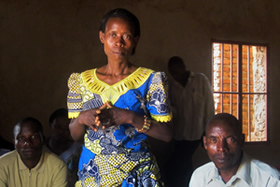Overview: Enabling Policy Environments
 |
| Dancilla Mukamana became a member of the Ibyiza Birimbere farmer cooperative at the insistence of other women farmers, and a loan from the cooperative resulted in increased productivity on her farm. Today, she has made home improvements such as a metal door and roof, and has become a decision-maker in her household. (Photo: UN Women/Ana Lukatela) |
Policy environments enable rural women's empowerment when they address the gender disparities and discrimination that exist across different sectors, including agriculture, rural development, forestry, fisheries, trade, finance, education, health and environment. As such, policies that are complementary and coherent are essential to rural women fully enjoying their rights, and participating and leading in economic, social and political matters.
Various agencies in the Task Force work towards supporting policy environments that enable rural women's empowerment. For example, UN Women will draw on the UN System-wide Action Plan (SWAP), which it is currently developing, to support its work on rural women. The SWAP seeks to establish a common framework to harmonize understanding of, and accountability to, the UN system's work on gender equality and the advancement of women.
UN Women also builds women's capacity and provides support to the formation of networks to ensure that rural women's voices are heard, have influence and are equally effective in decision-making and direction-setting at the household, local and national level.
UNDP provides country-wide (including rural) sex-disaggregated statistics through its Human Development Reports (HDRs). The development of the new Gender Inequality Index (GII), launched in 2010, which specifically tracks the correlation between gender inequality and other inequalities, is a major advance that will assist governments to re-shape economic policy dialogue and planning priorities in ways that support faster progress towards gender equality. UNDP's Gender Needs Assessment Tool is also being used in the national planning and budgeting processes of a number of countries.
UNFPA supports countries to collect and analyze and census data and in 2012 will roll out a manual for gender responsive analysis of census. This will provide key data on rural women. UNFPA is working with UNSD and other UN agencies to develop a minimum core set of gender indicators to facilitate evidence creation for improved policies targeted to groups in different geographic areas, including rural women.
The Permanent Forum on Indigenous Issues provides a significant opportunity to indigenous rural women to have their voices heard by strengthening their participation, especially at the international level.
The ITC-ILO's Gender and Non Discrimination Programme supported the participation of and leadership of women in rural institutions (including agricultural producer and rural worker associations, cooperatives, rural credit unions, water users' groups and self-help groups as well as women's organizations) in promoting women's empowerment, knowing their rights and organizing themselves.
FAO works to strengthen sex disaggregation in agricultural statistics, for example in the World Agricultural Census. FAO promotes participatory policy processes for agriculture and rural development that include the perspectives of small producers, both rural women and men.